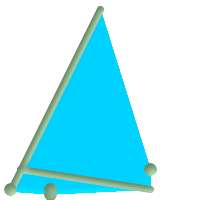Name
ST_ConvexHull — Computes the convex hull of a geometry.
Synopsis
geometry ST_ConvexHull(geometry geomA);
Description
Computes the convex hull of a geometry. The convex hull is the smallest convex geometry that encloses all geometries in the input.
In the general case the convex hull is a Polygon. The convex hull of two or more collinear points is a two-point LineString. The convex hull of one or more identical points is a Point.
It is usually used with Multi* and GeometryCollections. It is not an aggregate function. To compute the convex hull of a set of geometries, use ST_Collect to aggregate them.
One can think of the convex hull as the geometry obtained by wrapping an elastic band around a set of geometries. This is different from a concave hull which is analogous to "shrink-wrapping" the geometries. A convex hull is often used to determine an affected area based on a set of point observations.
Performed by the GEOS module
 This method implements the OpenGIS Simple Features
Implementation Specification for SQL 1.1. s2.1.1.3
This method implements the OpenGIS Simple Features
Implementation Specification for SQL 1.1. s2.1.1.3
 This method implements the SQL/MM specification. SQL-MM 3: 5.1.16
This method implements the SQL/MM specification. SQL-MM 3: 5.1.16
 This function supports 3d and will not drop the z-index.
This function supports 3d and will not drop the z-index.
Examples

Convex Hull of a MultiLinestring and a MultiPoint
SELECT ST_AsText(ST_ConvexHull(
ST_Collect(
ST_GeomFromText('MULTILINESTRING((100 190,10 8),(150 10, 20 30))'),
ST_GeomFromText('MULTIPOINT(50 5, 150 30, 50 10, 10 10)')
)) );
---st_astext--
POLYGON((50 5,10 8,10 10,100 190,150 30,150 10,50 5))
Using with ST_Collect to compute the convex hulls of geometry sets.
--Get estimate of infected area based on point observations SELECT d.disease_type, ST_ConvexHull(ST_Collect(d.the_geom)) As the_geom FROM disease_obs As d GROUP BY d.disease_type;